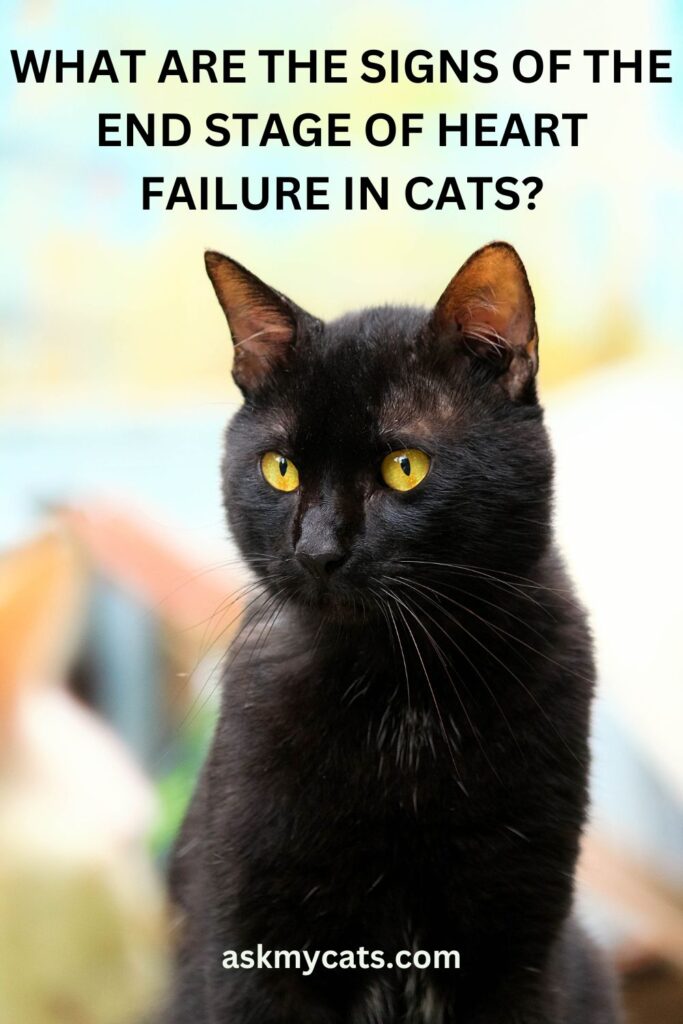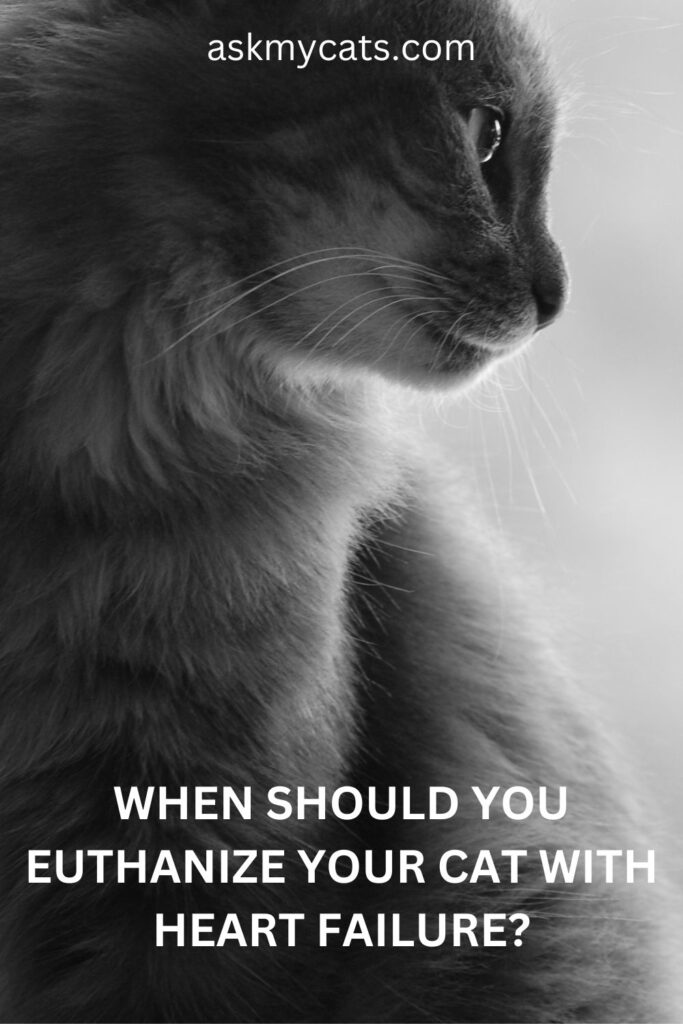A terminal problem, such as congestive heart failure, drastically reduces the quality of life of pets. If your cat is suffering from congestive heart failure, you need to be mentally prepared that this condition can progressively become tougher to treat.
And when that happens, you need to be prepared to take difficult end-of-life decisions for your pet.
So, when exactly is the right time to euthanize a cat suffering from congestive heart failure?
Key Takeaways
- Cats with heart failure may have a good chance at a long life if diagnosed early and treated properly
- The end stage of heart failure in cats is characterized by symptoms such as chronic coughing, difficulty breathing, and an inability to eat or drink
- The life expectancy of cats with heart failure varies depending on the stage at which the condition is diagnosed
- Before considering euthanasia, pet owners should try alternate treatments and switch to hospice care
- The decision to euthanize a cat with heart failure is a personal one, but should be made with the guidance of a veterinarian and when the cat is no longer responding to treatments and is suffering.


Give Your Cat the Perfect Day
Get the Free Ebook!
What Are The Signs Of The End Stage Of Heart Failure In Cats?

Cats with an early diagnosis of heart failure have a healthy chance at a long life. They will need lifelong medications and regular visits to the vet – but they don’t need to be euthanized.
As long as the treatments are working, you don’t need to worry about taking a decision to euthanize your cat.
It is when your cat starts developing symptoms of the end stage of heart failure that you may need to switch to either hospice care or opt for euthanasia.
This is why it is important for you, as the pet owner, to be aware of what end-stage heart failure could look like in cats.
The most common symptoms and signs include:
- Chronic cough or wheezing
- Dyspnea – acute shortness of breath and trouble breathing
- Increased heart rate and heart palpitations
- Swellings caused by trapped fluids
- Refusal to eat or drink
- Inability to defecate or urinate or use the litter box
Other than all these symptoms, the most important sign that you may need to take end-of-life decisions for your cat is when your cat’s health stops responding to any treatment.
Must Read: When To Put Your Cat Down? The Complete Checklist
What Is The Life Expectancy Of Cats With Heart Failure?

If the heart failure of your cat has been diagnosed early on, your cat has a greater chance of surviving for a substantial amount of time.
Most cats with an early diagnosis need a lifelong treatment – this includes medications, x-rays, blood tests, and constant vigil on part of the cat’s pet owner.
If you take proper care of your cat after an early diagnosis of heart failure, your cat will be able to live for close to 3 to 4 years.
However, the later the diagnosis, the worse the prognosis. This means that if your cat’s heart condition is diagnosed at a later stage, it may not be able to survive that long.
Most cats with a delayed diagnosis of heart failure can live for 12 to 18 months with proper treatment.
In the worst-case scenario, if your cat’s heart condition is diagnosed in the end stage, it may have only a couple of months to live.
Cats with end-stage heart failure can live for close to 3 months without treatment or with hospice care. With treatment, they may be able to live for around 6 to 8 months.
Interesting Read: How To Euthanize A Cat With Over-The-Counter Drugs?
When Should You Euthanize Your Cat With Heart Failure?

Your decision to euthanize your cat is a personal decision. But you should not immediately jump to this decision.
It is always recommended that you first talk to your vet about your cat’s disease and prospects of recovery.
There are two things that you should do before you consider euthanizing your cat:
1 – Try Alternate Treatments
In the case of congestive heart failure, a cat needs to be undergoing treatment for its entire lifetime.
There are different medicines of different powers that your vet may prescribe depending on the condition of your cat.
When one form of treatment stops working, you should opt for another. If, for instance, your cat has started refusing to eat anything, you could try IV.
If you have the resources for it, and if your cat has even a slight chance of responding to an alternate treatment, you should discuss that with your vet.
However, note that you should not force multiple treatments on your cat if it is visibly suffering. Even the process of undergoing treatment is painful and physically and mentally exhausting.
2 – Try Hospice Care
When your cat stops responding to any treatment, you should switch to hospice care. This will involve giving painkillers that allow your cat to remain painless and pass away in peace when its time comes.
Sadly, as congestive heart failure progresses, even hospice care loses its effectiveness.
Interesting Read: Did I Put My Cat To Sleep Too Soon?
Euthanizing Your Cat With Heart Failure
The saddest part of being a pet owner is that sometimes you are put in a position where you may have to decide to end your pet’s life.
This is the case with many cat parents whose cats have end-stage heart failure. When even hospice care stops working, you need to consider euthanasia as the only alternative.
Heart failure in the final stage leads to the death of a cat. And while it may seem ideal to let a cat peacefully succumb to the illness, the death that comes with heart failure is seldom peaceful.
Also Read: Where To Euthanize A Cat For Free Or Cheap?
A cat with final-stage heart failure will experience seizures, total or partial blindness, acute shortness of breath, and tightness in its chest because of the fluid influx in its lungs before it passes away due to congestion. It won’t be an easy death for your pet.
This is why, if your cat is experiencing final-stage heart failure and if it has stopped responding to hospice care, you should consider euthanizing your cat. Euthanasia will ensure that your cat passes away in as painless a way as possible.
Interesting Read: How To Do Cat Euthanasia Yourself At Home?
Frequently Asked Questions
Should I put my cat down if he has congestive heart failure?
You might be able to take your cat home and manage its condition for a little while longer if they get better within 48 hours of receiving treatment. However, it is typically time to say goodbye if your cat has cardiac symptoms that do not get better with treatment.
Can heart failure come on suddenly in cats?
A few cardiac conditions have “peracute” or abrupt onsets. Sudden onset heart disease in cats might come as quite a shock if they haven’t had a full medical check and may not have any prior symptoms.
Why do cats with heart failure cough?
When heart failure sets in, your cat will initially start breathing more quickly before becoming breathless. As fluid begins to accumulate in the lungs, coughing may be experienced.
Interesting Read: Did My Cat Know He Was Being Put To Sleep?
Final Words
Congestive heart failure is a condition that affects cats in different stages. It is often progressive, and the end stage of this condition is painful and makes life insufferable for cats.
Cats with an early diagnosis are able to live relatively comfortably for 3 to 4 years. They will need lifetime medication and treatment, but they will survive.
However, cats with a late diagnosis often have less than a year to live. When treatments stop working and hospice care doesn’t help with the pain either, it may be time for you to euthanize your cat with heart failure.
Interesting Read: Should I Stay With My Cat When It Is Euthanized?
Must Read: How To Deal With Regret And Grief After Putting Cat To Sleep?
A Cat Owner’s Final Guide: What To Do After Cat Euthanasia?
Interesting Read: Is It Legal To Euthanize A Healthy Cat?
You Might Also Like To Read:
- What Are The Different Methods Of Cat Euthanasia?
- How Much Does It Cost To Euthanize A Cat?
- When To Euthanize A Cat With Cancer?
- When To Euthanize A Cat With Seizures?
- When To Euthanize A Cat With IBD?
- When To Euthanize A Cat With Kidney Failure?
- When To Euthanize A Cat With Feline Leukemia?
- When To Euthanize A Cat With FIP?
- When To Euthanize A Cat With FIV?
- When To Euthanize A Cat With Dementia?
- When To Euthanize A Cat With Arthritis?
- When To Euthanize A Cat With Hyperthyroidism?
